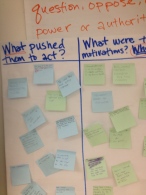“The best way to find yourself is to lose yourself in the service of others.”
On Veterans Day, I’m thinking about young people putting their lives at risk to serve a higher purpose. I’m thinking of the 18 and 19-year olds who have come to tell me they were joining the Military Service, how they yearned for the promised career options, training, potential honor and disciplined habits. They wanted to serve a bigger cause. They didn’t acknowledge risks—at least not in our conversations.
When people complain about teenagers being self-centered, I ask, “Where are opportunities and support for them to take on a bigger purpose?”
At Denver Center for International Studies schools, K-12 students have had multiple opportunities to contribute to the school, local community and world. I have seen countless teenagers provided with tools and information to apply their learning to real issues and make a difference.
As part of Asia Society’s International Studies Schools Network, the whole DCIS@Baker faculty piloted a curriculum framework (Graduate Performance System) with authentic application of project based learning in mind.
Because this framework provided guidance to achieve the school’s vision for students as global leaders (who contribute to the well-being of others), faculty and students embraced it as an integral part of the school’s identity. Since it was a pilot, teachers and students created their own details of implementation that worked for them. With a small amount of grant money, teachers were provided with a couple days release time to think, plan and collaborate.
We plunged forward through the first messy year toward establishing systems, routines and organizational clarity for transformative curriculum. While the complexities were sometimes daunting, four domains of global competence and four instructional principles were simple enough to be internalized by teachers and students yet profound enough to transform teaching.
Domains of Global Competence: Investigate the World; Recognize Perspectives; Communicate Ideas and Take Action
Four Instructional Principles for Great Projects: Student Choice, Authentic task that adults do in the real world; Global Connection; Exhibition beyond the teacher.
A big step in the third year was the development by students and teachers of an assessment rubric for Senior Portfolios organized around the four domains of global competence that made it core to student school life.
For more details, visit http://asiasociety.org/education/resources-schools/professional-learning/gps-future-success
Or videos of DCIS students and teachers talking about deeper learning and global competence at teaching channel.org: <script src=’https://www.teachingchannel.org/videos/deeper-learning-senior-presentations-asis/embed.js?width=480′ type=’text/javascript’></script>
On this frigid snowy Veterans Day in Colorado, I’m appreciating the human longing to contribute, the ability to rise to the occasion and the capacity to risk even one’s life in dedication to a cause.

